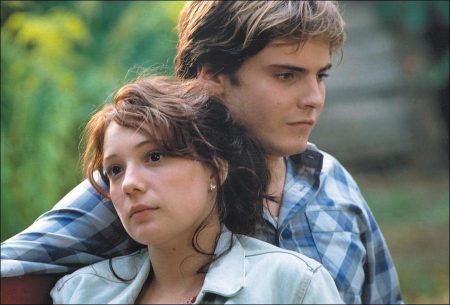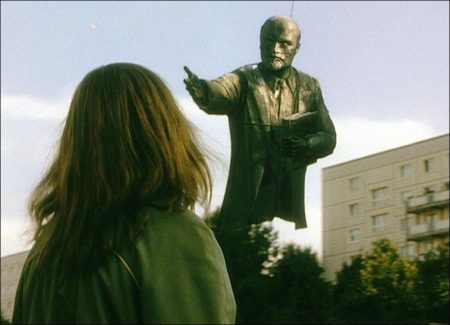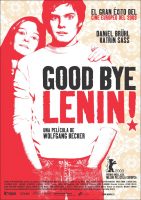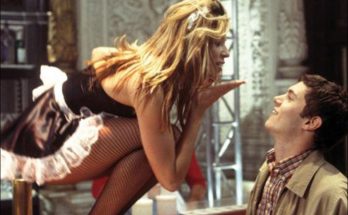Director’s Comments
An Important Chapter of German History
I was fascinated by the idea of a son trying to save his mother’s life, trying to keep death at bay with a lie and getting more and more entangled in his lie about an East Germany that no longer exists, and that he wants to make his mother continue to believe in.
This is something that’s universal and could be totally separated from this specific past, this whole East German story and the fall of the Wall and reunification. I was excited by the idea of combining both aspects and relating an important chapter of German history as well, or least having it as a background. That’s what’s so wonderful about this topic. It’s a slice of German history, but it’s told Incidentally and not placed in the forefront of the story.
Actor Daniel Brühl
I wanted people to believe in Daniel Brühl’s character, and to believe that he does this without having analyzed everything beforehand. And Daniel portrays this fantastically, because he is simply a very emotional actor. Not for one second do I have any doubts about him, or why he does all of this for his mother. He makes it seem totally compelling that at the very moment in which he could actually be taking concrete steps toward the future – he’s just fallen in love, has so many options to choose from, it’s a wonderful summer of change – he suddenly moves in a different direction, namely backwards, to rebuild what everyone else is merrily leaving behind. Daniel brings just the right warmth and emotional component to the role, which makes you immediately forget why he goes through this for his mother.
Actress Katrin Sass
When I think of Katrin Sass, I immediately think of her naturalness and the naturalness of her speech; of the way she has of relying on few means and never even coming close to overacting. To me, film is also always a cinema of the eyes, and her eyes are just perfect, which is something you don’t encounter too often.
On the Character of the Mother
I would definitely not call her a hard-line socialist. I would describe her rather as a woman with a classical helper’s syndrome, a type that exists in other social systems as well. There is nothing typically former East German-like here. She’s a woman who takes great enjoyment in helping others, and even feels a certain obligation to do so. She’s a woman who lives in a country without alternatives. She just can’t go anywhere else.
The Narrative Quality of Props
Certain details are important to me, for example, the narrative quality of props, the idea that certain props have to be just right and that you just can’t deal arbitrarily with certain chronological developments determined by events such as the monetary union and the fall of the Wall.
A West German Taking on an East Topic
I grew up in the West but I’ve been living in Berlin for a long time now. I knew East Germany and East Berlin, but naturally I’ve never personally – with my senses – experienced what it was like to grow up in that country, to have spent my childhood or youth there, to have lived through the fall of the Wall and to have finally tasted this feeling of being free, of freedom in the sense of freedom to travel or of civil rights.
We met many people who were around 20 at the time of the fall of the Wall. We had them tell us what they experienced back then. These stories were all very different, sometimes even conflicting. We didn’t incorporate this into the script or the film, neither through a dialogue or a scene, but it did give both of us a sense of security while we were writing the screenplay, and to me while directing. It gave us the feeling that the story we’re telling is solid and consistent.
Use of Existing Archival News Material
What’s interesting here is that we didn’t even shoot one single new frame for this. All we had to do was take the existing archival material and put it in a different context. You can see how quickly you can fake things with pictures and a slightly altered commentary — which makes you doubt whether the pictures were already completely truthful in their original context, and how much truth is to be found in pictures to begin with.
On Comedy
I didn’t want Goodbye Lenin! to be farcical. Everyone feels differently about how far comedy – in the best sense of the word – can go, and about the point when it tips over into slapstick and foolishness. I feel that you have real comedy when the characters that make us laugh don’t feel at all like laughing themselves — the last thing we’d want is to switch lives with them. We’re quite happy that they’re the ones who are going through all this, and that we can just sit back and watch and be glad we’re not the ones to have to experience it. A good comedy always has a very serious basis.
Tragicomic Element
I am still always moved by the scene in which Ariane tells her brother in the bathroom that she saw their father, that she recognized his voice – and we see the scene simultaneously in the form of a little flashback. When her brother asks her, “What did you say to him?” and she replies: “Enjoy your meal and thank you for choosing Burger King” – there’s something profoundly tragicomic about this.
Bad Luck on the Set
The cottage that the family hadn’t been to in ten years obviously had to look overgrown with weeds. But you can’t find a cottage that’s both photogenic and that’s been covered with weeds for ten years. So you start two months earlier by having a landscape gardener plant weeds found somewhere else. In our first attempt to shoot there, it rained – but we needed a beautiful late summer day. The second time we had the problem that a horde of wild boars had rampaged in the garden the night before and trampled down everything we had planted. Something like this happened every day.
And this is what’s terrifying for a director: you can’t give up. You’ve reached a certain level of quality every day, at a certain time of the day, and you owe this to the wonderful actors and team. You just can’t say, “We’ve had so much bad luck and so many misfortunes, let’s just give up taking all this so seriously.” The film would suffer a loss of quality at precisely this moment of the production. You have to be very persistent and steadfast, and to insist on maintaining this level of quality.
X Filme
There’s a great feeling of partnership here. We’re not on two sides of the table, where the producer fights with the director and the director fights with the producer: we’re all in the same boat. Obviously, there are still differences of opinion, even considerable ones. But I feel that this virulence, this need of always having to fight, of always having to define oneself anew and reinvent oneself, is the reason why X Filme has been in business for so long. I feel that the variety among the directors who work there – the founding directors – as well as these eternal processes of change and reinvention, is what keeps the shop running.
Good Bye Lenin! (2003)
Directed by: Wolfgang Becker
Starring: Daniel Brühl, Katrin Saß, Chulpan Khamatova, Maria Simon, Alexander Beyer, Florian Lukas, Christine Schorn, Jürgen Holtz, Jochen Stern, Eberhard Kirchberg
Screenplay by: Wolfgang Becker, Bernd Lichtenberg
Production Design by: Lothar Holler
Cinematography by: Martin Kukula
Film Editing by: Peter R. Adam
Costume Design by: Aenne Plaumann
Art Direction by: Matthias Klemme
Music by: Yann Tiersen
MPAA Rating: R for brief language and sexuality.
Distributed by: Sony Pictures Classics
Release Date: February 17, 2003
Visits: 77






